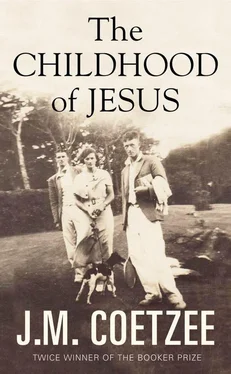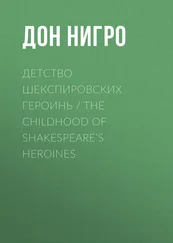Writing from left to right, forming the letters clearly if slowly, the boy writes: Yo soy la verdad , I am the truth.
‘You see,’ says señor León, turning to Inés. ‘This is what I had to deal with day after day while your son was in my class. I say, there can be only one authority in the classroom, there cannot be two. Do you disagree?’
‘He is an exceptional child,’ says Inés. ‘What kind of school are you running if you cannot cope with a single exceptional child?’
‘Refusing to listen to his teacher does not mean a child is exceptional, it just means he is disobedient. If you insist the boy must have special treatment, let him go to Punto Arenas. They know how to deal with exceptional children there.’
Inés comes erect, her eyes blazing. ‘Over my dead body will he go to Punto Arenas!’ she says. ‘Come, my darling!’
Carefully the boy replaces the chalk in its box. Glancing neither left nor right, he follows his mother out of the room.
At the door Inés turns and hurls a last shaft at señor León: ‘You are not fit to teach children!’
Señor León shrugs indifferently.
As the days pass, Inés’s sense of outrage only grows stronger. She spends hours on the telephone to her brothers, making and remaking plans to leave Novilla and start a new life elsewhere, beyond the reach of the education authorities.
As for him, mulling over the episode in the classroom, he finds it harder to feel ill-used. He does not like the autocratic señor León; he agrees with Inés that he should not be in charge of small children. But why does the boy resist instruction? Is it just some inborn spirit of rebelliousness flaring up in him, fanned by his mother; or has the bad feeling between pupil and teacher a more specific cause?
He takes the boy aside. ‘I know señor León can sometimes be very strict,’ he says, ‘and you and he have not always got along well. I am trying to understand why. Has señor León ever said anything nasty to you that you haven’t reported to us?’
The boy gives him a puzzled look. ‘No.’
‘As I said, I am blaming no one, I am only trying to understand. Is there some reason why you don’t like señor León, besides the fact that he is strict?’
‘He has a glass eye.’
‘I am aware of that. He probably lost it in an accident. He probably feels sensitive about it. But we don’t make enemies of people just because they have glass eyes.’
‘Why does he say there is no Don Quixote? There is a Don Quixote. He is in the book. He saves people.’
‘True, there is a man in the book who calls himself Don Quixote and saves people. But some of the people he saves don’t really want to be saved. They are happy just as they are. They get cross with Don Quixote and shout at him. They say he doesn’t know what he is doing, he is upsetting the social order. Señor León likes order, David. He likes calm and order in his classroom. He likes order in the world. There is nothing wrong with that. Chaos can be very disturbing.’
‘What is chaos?’
‘I told you the other day. Chaos is when there is no order, no laws to hold on to. Chaos is just things whirling around. I can’t describe it any better.’
‘Is it like when the numbers open up and you fall?’
‘No, it isn’t, not at all. The numbers never open up. We are safe with the numbers. The numbers are what hold the universe together. You should make friends with the numbers. If you were more friendly to them, they would be more friendly to you. Then you would not have to fear they will give way beneath your feet.’
He speaks as earnestly as he can, and the boy appears to hear that. ‘Why was Inés fighting with señor León?’ he asks.
‘They were not fighting. There was a flare-up between them, which they probably both regret, now that they have had time to reflect. But that isn’t the same as fighting. Strong words aren’t fighting. There are times when we have to stand up for those we love. Your mother was standing up for you. That is what a good mother, a brave mother, will do for her children: stand up for them, protect them, as long as there is breath left in her body. You should be proud to have a mother like that.’
‘Inés isn’t my mother.’
‘Inés is your mother. She is a true mother to you. She is your true mother.’
‘Are they going to take me away?’
‘Is who going to take you away?’
‘The people from Punto Arenas.’
‘Punto Arenas is a school. The teachers at Punto Arenas don’t kidnap children. That’s not how the education system works.’
‘I don’t want to go to Punto Arenas. Promise you won’t let them take me.’
‘I promise. Your mother and I won’t allow anyone to send you to Punto Arenas. You have seen what a tiger your mother is when it comes to defending you. No one will get past her.’
The hearing takes place at the headquarters of the Office of Education in Novilla. He and Inés are there at the appointed time. After a short wait they are escorted into a huge, echoing chamber, with row upon row of empty seats. At the head, on a raised bench, sit two men and a woman, judges or examiners. Señor León is already in attendance. No greetings pass.
‘You are the parents of the boy David?’ says the judge in the centre.
‘I am his mother,’ says Inés.
‘And I am his godfather,’ says he. ‘He does not have a father.’
‘His father is deceased?’
‘His father is unknown.’
‘With which of you does the boy live?’
‘The boy lives with his mother. His mother and I do not live together. We do not have a connubial relationship. Nevertheless the three of us are a family. Of sorts. We are both devoted to David. I see him every day, almost.’
‘We understand that David attended school for the first time in January, and was assigned to señor León’s class. Then after some weeks had passed you were called in together for a consultation. Is that correct?’
‘Correct.’
‘And what did señor León report to you?’
‘He said that David was making poor academic progress, also that he was insubordinate. He recommended that he be removed from the class.’
‘Señor León, is that correct?’
Señor León nods. ‘I discussed the case with señora Otxoa, the school psychologist. We agreed that David would benefit from being transferred to the school at Punto Arenas.’
The judge looks around. ‘Is señora Otxoa present?’
A court official whispers in his ear. The judge speaks: ‘Señora Otxoa cannot be present but has submitted a report which. .’ — he shuffles through his papers — ‘which, as you say, señor León, recommends a transfer to Punto Arenas.’
The judge on the left speaks. ‘Señor León, can you explain why you feel such a move is necessary? It seems a very stern measure, to send a six-year-old to Punto Arenas.’
‘Señora, I have twelve years’ experience as a teacher. In all that time I have not had a like case. The boy David is not stupid. He is not handicapped. On the contrary, he is both gifted and intelligent. But he will not accept direction and he will not learn. I devoted many hours to him, at the expense of the other children in the class, trying to coax into him the elements of reading, writing, and arithmetic. He made no progress. He grasped nothing. Or rather, he pretended to grasp nothing. I say pretended because in fact he could already read and write by the time he came to school.’
‘Is this true?’ asks the presiding judge.
‘Read and write, yes, intermittently,’ he, Simón, responds. ‘He has good days and bad days. In the case of arithmetic he is experiencing certain difficulties, philosophical difficulties I like to call them, that hinder his progress. He is an exceptional child. Exceptionally intelligent, and exceptional in other ways too. He taught himself to read out of the book Don Quixote , in an abridged version for children. I became aware of this only very recently.’
Читать дальше












